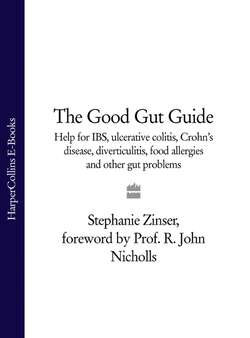Читать книгу The Good Gut Guide: Help for IBS, Ulcerative Colitis, Crohn's Disease, Diverticulitis, Food Allergies and Other Gut Problems - Stephanie Zinser - Страница 71
The Future of Diagnostic Tests
ОглавлениеScientists are continually trying to make medical examinations less uncomfortable for the patient and more detailed for the doctor. Conventional imaging tests often fail to spot the source of intestinal bleeding because they can’t see the entire length of the gut. Upper endoscopies can only see down as far as the first third of the small intestine, while colonoscopies can only see up to the last metre (3–4ft) or so of small intestine. Because the small intestine is 5–6 metres (15–20ft) long, this leaves a 2–3 metre (5–10ft) section in the middle that cannot normally be seen at all.
One of the newest innovations is a tiny camera-in-a-capsule which gives extraordinarily accurate pictures of the intestinal tract. Containing a battery, light source, radio transmitter and camera, the capsule (the size of a large multivitamin tablet) transmits pictures of the intestines to a wireless recorder the patient wears on a belt. After swallowing the capsule, the patient carries on as normal while the images are collected, then, 6–8 hours later, the pictures are downloaded onto a computer for the doctor to view. Preliminary trials of capsule-camera devices already indicate a high degree of success in locating gastrointestinal bleeding.
Recent work conducted by a team at the Ludwig Institute for Cancer Research, New York Branch at Memorial Sloan-Kettering, shows that the way the immune system reacts to specific tumour markers (antigens) may eventually offer an opportunity for doctors to detect bowel cancer. By identifying which of these antigens is produced by bowel cancers and then identifying any antibodies to them in blood samples, doctors may find a quick and reliable method for detecting bowel cancers at very early stages. Work continues on identifying more of the specific colon cancer antigens (about a dozen are known so far).
